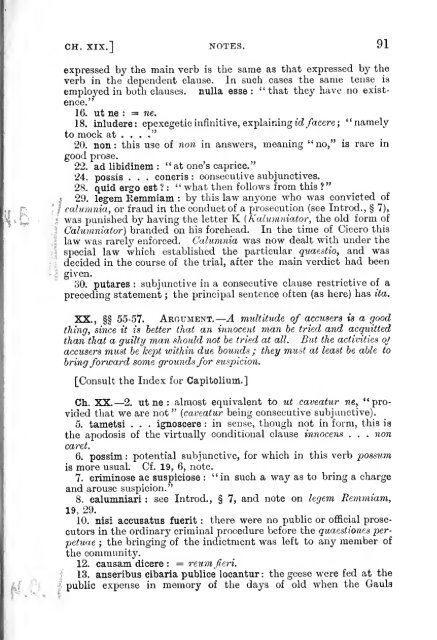Pro S. Roscio Amerino
Pro S. Roscio Amerino
Pro S. Roscio Amerino
Create successful ePaper yourself
Turn your PDF publications into a flip-book with our unique Google optimized e-Paper software.
K.&,<br />
CH. XIX.]<br />
expressed by the main verb is the same as that expressed by the<br />
verb in the dependent clause. In such cases the same tense is<br />
that they have no exist-<br />
employed in both clauses. nuUa esse : "<br />
ence."<br />
16. ut ne : =<br />
ne.<br />
18. inludere: epexegeticinfinitive, explainingid/acere; "namely<br />
to mock at . . . ."<br />
20. non : this use of non in answers, meaning "no," is rare in<br />
good prose.<br />
22. ad libidinem : "at one's eaprice."<br />
24. possis . . . coneris : consecutive subjunctives.<br />
28. quid ergo est ? " : what then foUaws from this ? "<br />
I 29. legem Remmiam : by this law anyone who was convicted of<br />
/ calumnia, or fraud in the conduct of a prosecution (see Introd., § 7),<br />
I<br />
was punished by having the letter K (Kalumniator, the old form of<br />
Calumniator) branded on his forehead. In the time of Cicero this<br />
law was rarely enforced. Calumnia was now dealt with under the<br />
special law which establislied the particular quaestio, and was<br />
decided in the course of the trial, after the main verdict had been<br />
given.<br />
oO. putares : subjunetive in a consecutive clause restrietive of a<br />
preceding statement ; the principal sentence often (as here) has ita.<br />
XX., §§ 55-57. Aegument.—A multitude of accusera ia a good<br />
thing, since it is better that an innocent man be tried and acquitted<br />
than that a guilty man should not be tried at all. But the activities ot<br />
accusers must be kept within due bounds ; they must at least be able to<br />
bringforward some grounds for suspicion.<br />
[Consult the Index for Capitolium.]<br />
Ch. XX. —2. ut ne : almost equivalent to ut caveatur ne, "provided<br />
that we are not " (caveatur being consecutive subjunctive).<br />
5. tametsi . . . ignoscere : in sense, though not in form, this is<br />
the apodosis of the virtually conditional clause innocens . . . non<br />
caret.<br />
6. possim : potential subjunctive, for which in this verb possum<br />
is more usual. Cf. 19, 6, note.<br />
7. criminose ac suspiciose " : in such a way as to bring a charge<br />
and arouse suspicion."<br />
8. calumniari : see Introd., § 7, and note on legem Remmiam,<br />
19, 29.<br />
10. nisi accusatus fuerit : there were no public or official prosecutors<br />
in the ordinary criminal procedure before the quaestiones perpetuae<br />
; the bringing of the indictment was left to any member of<br />
the comraunitj'.<br />
12. causam dicere : = reumferi.<br />
i 13. anseribus cibaria publice locantur: thegeese were fed at the<br />
t public expense in memory of the days of old when the Gaula<br />
91

















